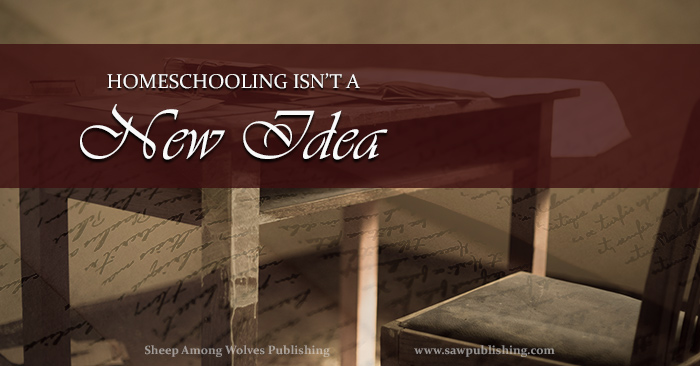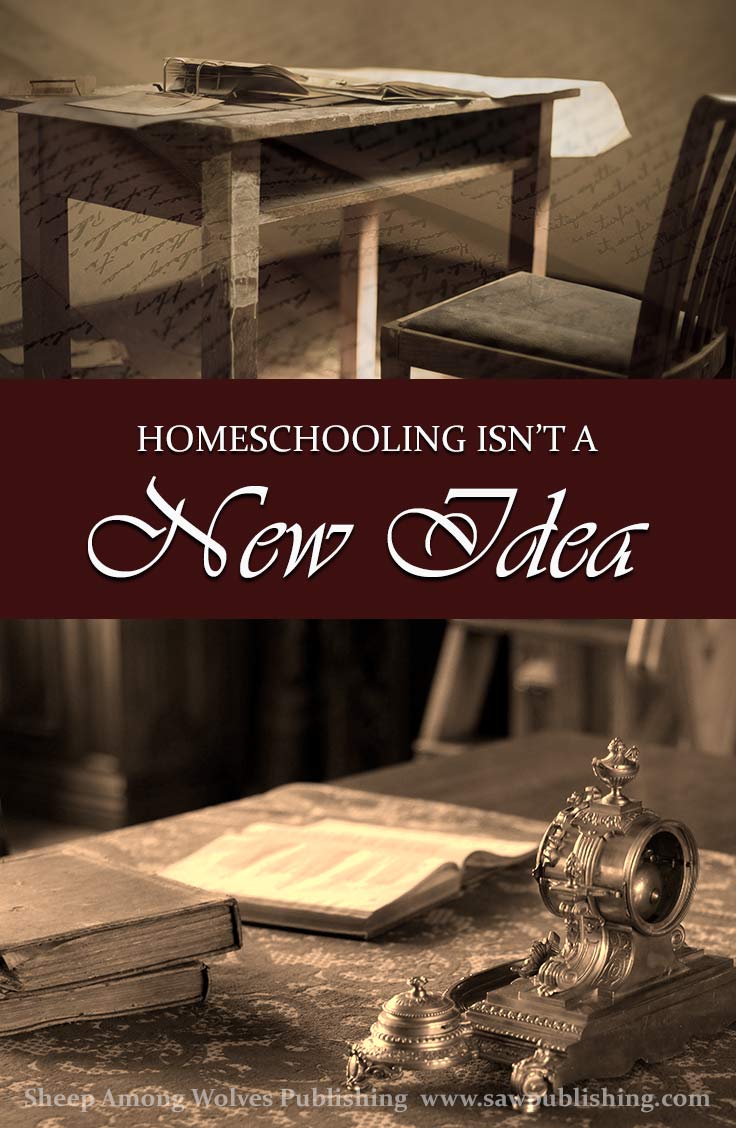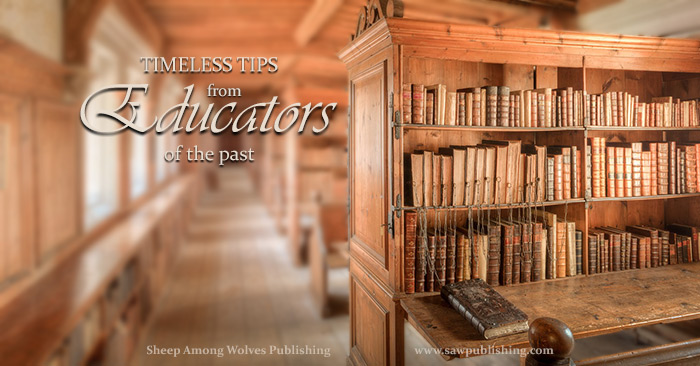Homeschooling Isn’t A New Idea
Timeless Tips from Educators of the Past is a companion series to our Timeless Tips from Homemakers of the Past – highlighting useful and thought provoking advice from the generations of educators who have gone before us. Our goal at Sheep Among Wolves is to provide a forum for Good and Great literature, and to help you in your quest for godly, high-quality resources. It is our hope that these Timeless Tips will be an aid and encouragement to you as you strive to follow the example of Deuteronomy 6 and diligently teach your children the words of the Lord.
 When did homeschooling begin?
When did homeschooling begin?
If you ask this question of most of today’s homeschooling parents, you will get one of two answers. The first places the rise of homeschooling sometime in the late 20th Century, as a counter-movement to the growing trend of secularization in Western culture. The second answer goes back to Deuteronomy 6, seeing homeschooling as God’s original design for education, and therefore dating its origin from Old Testament times.
But regardless of which answer they choose, most homeschoolers presume that homeschooling was virtually unpracticed until the last fifty years or so.
Is this really true?
Today we’re taking a look at three historical advocates of the principle of home education. These writers, spanning from the late 1700s to the late 1800s give us a glimpse into the convictions of historical homeschoolers, and offer three major reasons why Christians and educators of past generations valued the practice of homeschooling.
Please note that the authors quoted are cited for the purpose of highlighting the presence of homeschooling advocates in the past centuries. SAW Publishing is not necessarily recommending the whole of any author’s works or views. Please use personal discretion.
 Homeschooling Parents are the Best Teachers
Homeschooling Parents are the Best Teachers
Charlotte Mary Yonge was a Victorian writer and devout Christian. Herself a home educated student, and later involved in the education of her brother’s children, Miss Yonge had a strong belief in the power of family relationships and the value of home education. In 1877 she wrote:
“There is an odd notion abroad, that children do not learn so well of their nearest relations as of strangers. The fact is, I suspect, that the gift of teaching is not universal, and that the person whose profession it is, ought—either from natural ability, endowment, or experience—to be better qualified than the others; besides which, there are no old habits of spoiling to be broken through. Still it is a real disadvantage that mothers do not attempt to teach more, or at any rate to be the presiding power in their school-rooms.
Where mother or elder sister possesses the power, instruction comes from no one so well, and from no one is it so permanent or valuable . . . she will gain a hold over her children’s minds and affections, their trust and confidence, far above what comes of only meeting in holiday hours.” (Charlotte M. Yonge, Womankind)
The belief that parents are specially fitted to educate their children is an idea which has survived through generations.
Homeschooling can be Customized to the Student’s Needs
Isaac Taylor was a strong advocate for home education in the early 1800s. Isaac Taylor had been educated at home, and went on to choose the same educational model for his own children. His reasons for valuing homeschooling were multifaceted, but his educational system, embodied in the 1837 work Home Education is built around the concept of individualizing education to give each student the teaching best suited to their individual mind:
“. . . home education, and especially when conducted by parents themselves, or under their immediate superintendence, may, in its successive parts, be specially adapted to the minds that are to receive it; and may have the advantage of the most intimate knowledge of the ability, and tendency of each.” (Isaac Taylor, Home Education)
The author saw homeschooling as the most beneficial environment for developing students with exceptional talents, but he also saw it as the most helpful way of educating those who struggled in a classic school setting.
“In fact it is more than a few who leave school almost totally deficient in mental culture, not because they might not have learned what would have quickened the faculties, and have be applicable to the occasions of common life; but because they could never learn the particular things taught at school; or not learn them in the particular mode which the unalterable usages of public education admit of.
“Home education, therefore, in consequence of its power of adaptation, may be made highly advantageous as well to ungifted, as to gifted children.” (Isaac Taylor, Home Education)
It may be fair to mention that Isaac Taylor’s views on homeschooling did change in the course of his life; but while the prefaces to later editions of his Home Education substantially qualify his preference for educating boys at home, his faith in the underlying principles of his system remained unshaken. Individual minds, in Taylor’s opinion, required individual treatment if parents wished to bring out the best in each child.
Homeschooling Protects Children
William Cowper, one of the greatest poets the English language has ever known, did not regard his conventional school education as a positive model. Having been severely bullied at school himself, and observing the lack of confidence which sprang up between parents and children as a result of the prevailing educational system, Cowper became a vocal supporter of home education.
The following excerpt gives a sample of the strength of his conviction on this topic:
“Now look on him, whose very voice in tone
Just echoes thine, whose features are thine own,
And stroke his polish’d cheek of purest red,
And lay thine hand upon his flaxen head,
And say, ‘My boy, the unwelcome hour is come,
When thou, transplanted from thy genial home,
Must find a colder soil and bleaker air,
And trust for safety to a stranger’s care.’
* * * * *
Thou wouldst not, deaf to Nature’s tenderest plea,
Turn him adrift upon a rolling sea,
Nor say, Go thither, conscious that there lay
A brood of asps, or quicksands, in his way;
Then, only govern’d by the self-same rule
Of natural pity, send him not to school.
No—guard him better. Is he not thine own,
Thyself in miniature, thy flesh, thy bone?”
(William Cowper, The Works of William Cowper: His Life, Letters, and Poems)
This is strong language, but I think it would be fair to say that it finds an echo in the hearts of many homeschooling parents today.
Homeschooling Isn’t A New Idea!
I have a tremendous respect for the homeschooling parents of the late 20th Century. Unquestionably, they accomplished wonders in resurrecting and popularizing the concept of home education, as well as in convincing average Christian parents that they were capable of taking on the work of a full-time teacher.
Still, they were not the first homeschoolers. It is fascinating—and I think, particularly encouraging—to know that there were other homeschoolers, choosing to homeschool for the same reasons that parents choose to homeschool today, long, long before the modern homeschooling movement began.
Homeschooling is not an untried philosophy. It’s not a recent invention. It’s not an isolated movement.
In fact, homeschooling isn’t a new idea.
It’s part of a chain of faithful parents and educators that stretches back—far back—into history. May our generation form one link, to help it to pass forward into the future, as well.
Are you looking for more educational encouragement from the wisdom of past generations? See our previous post:

What do I do if my student hates reading? There may be no perfect recipe for getting your child to love reading. But there is a way to make sure they love great books!

Are you interested in adding hymns to your history course? SAW Publishing’s Hymns of American History is the perfect resource.

Are you feeling guilty because you secretly dread the task of keeping little hands out of mischief during long summer days? This post gives some tips for how to keep kids busy – and learning – during the weeks when they aren’t in school.

